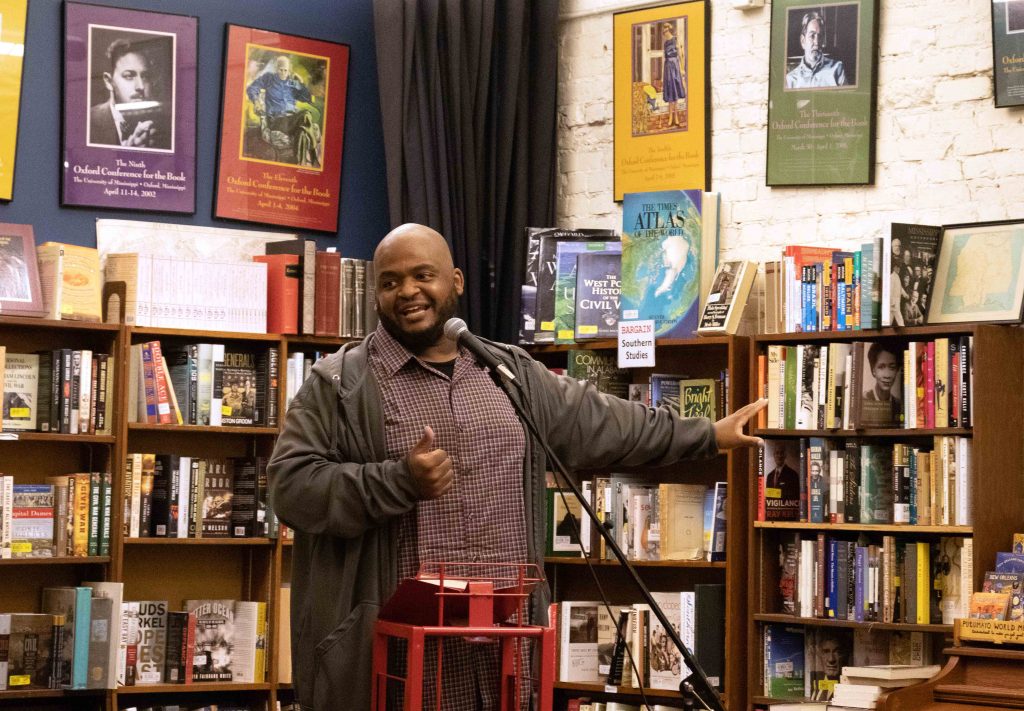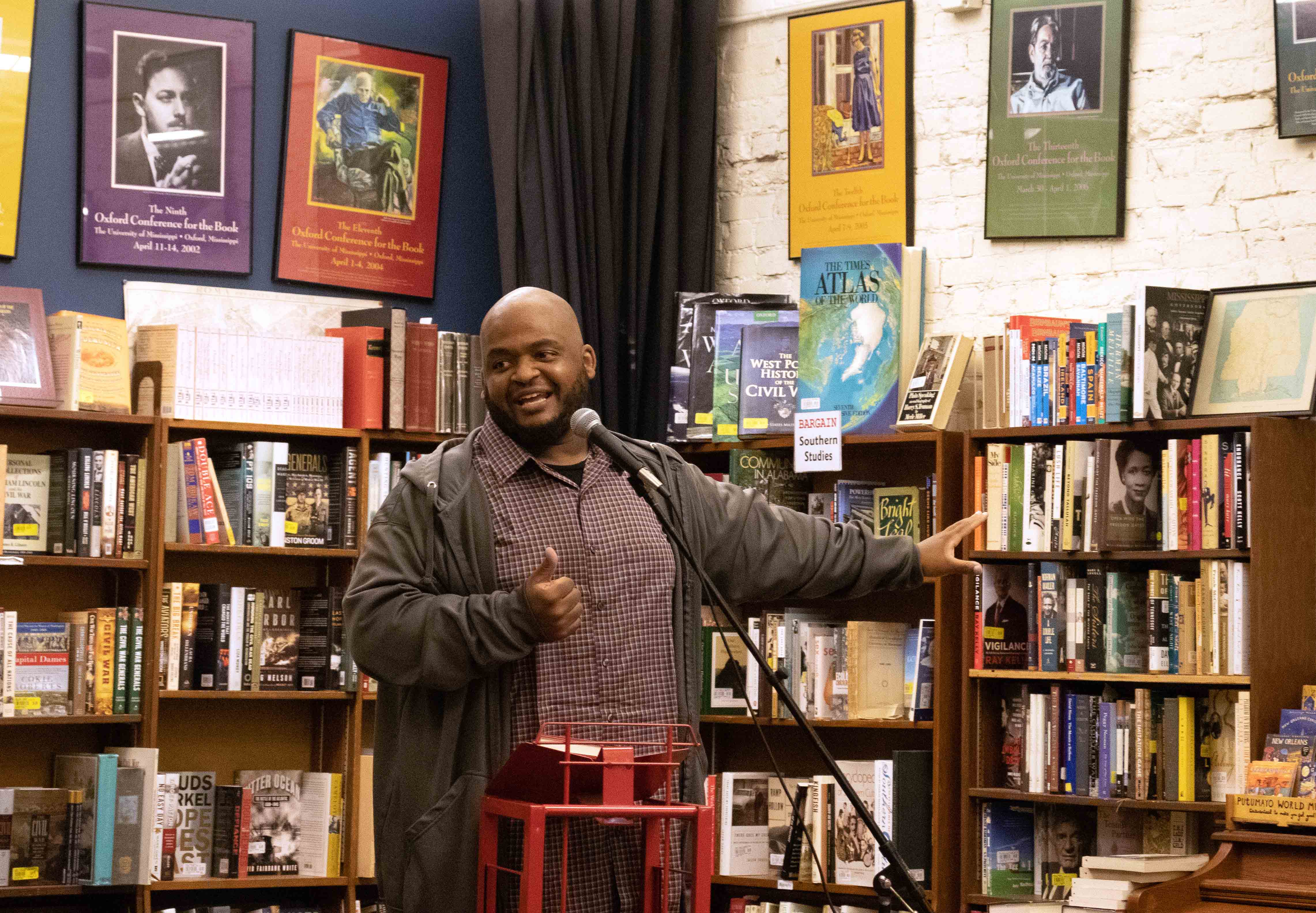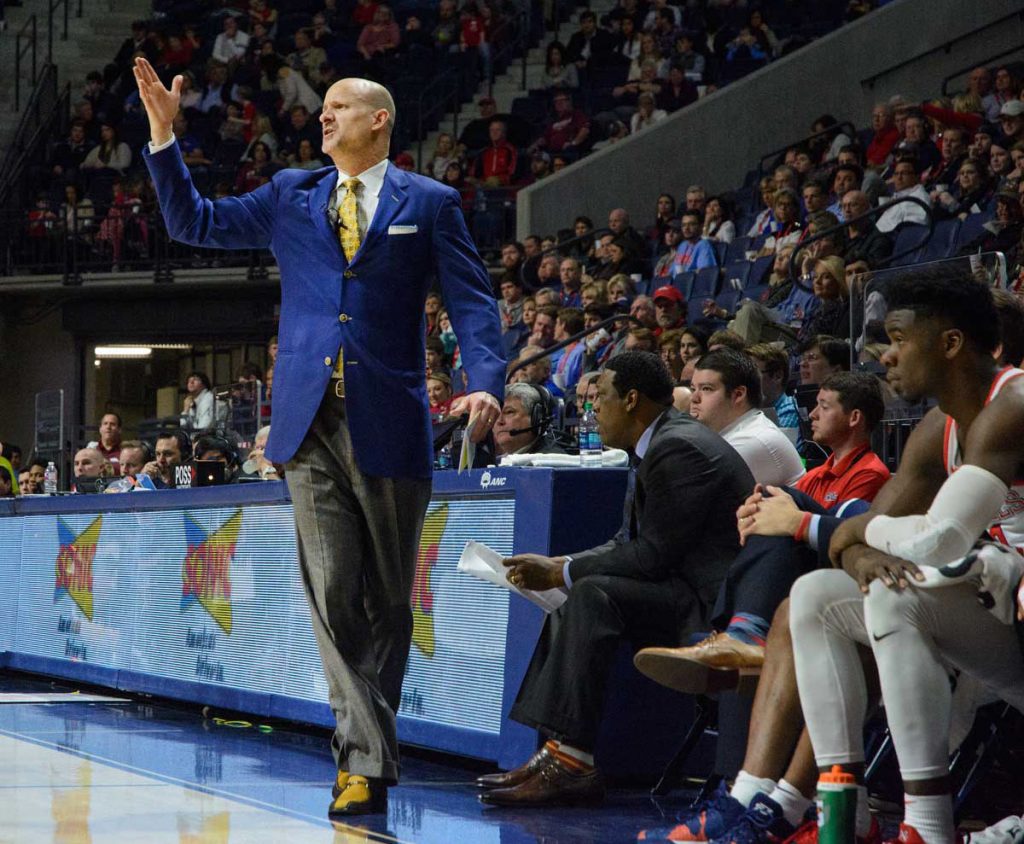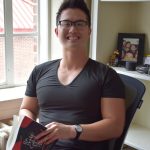Creative writing professor Kiese Laymon candidly detailed his Mississippi childhood, his relationship with his mother and his struggles with his weight at Off Square Books last night.
Laymon, hailed as “the chief blues scribe of our time” by fellow scholar and author Zandria Robinson, read from and signed his new memoir “Heavy: An American Memoir” at 5:30 p.m. on Tuesday at Off Square Books.

“Heavy,” which is written directly to Laymon’s mother, is his third book. Before this project, he’d published a novel, “Long Division,” and a collection of essays, “How to Slowly Kill Yourself and Others in America.” Like these previous books, “Heavy” reckons with race, family, the South and both physical and metaphorical weight. According to the book’s description, the memoir “charts his complex relationship with his mother, grandmother, anorexia, obesity, sex, writing, and ultimately gambling.”
In response to an audience member’s question, Laymon said the story in “Heavy” truly started as an idea when he was a child, but that — to this day — he is scared to tell this story. His previous works were simply building up to the honesty of “Heavy.”
“I had to write ‘Long Division,’ which is just this, like, weird experiment,” Laymon said. “I had to write ‘How to Slowly Kill Yourself and Others,’ which is another weird experiment in essayistic writing, in order to have the confidence in terms of skill to write something that I felt like could damage my relationship to my Mama and my family’s relationship to the world.”
Laymon said that “Heavy” still isn’t perfect, though.
“I still didn’t get it right but I’ll for sure be better with the next book,” he said.
The memoir has already received praise from advance readers. The Boston Globe’s review, for instance, called the work “staggering,” writing that “Laymon lays out his life with startling introspection.” “Heavy” was longlisted for both the Andrew Carnegie Medal and the Kirkus Prize.
At Tuesday’s event, Laymon read the beginning and end of a chapter titled “Greens,” which was published in full on Longreads recently. “Greens” focuses on Laymon’s trip back to Mississippi with his uncle from grad school in Indiana, visiting his Grandmama in the hospital and his struggles with an eating disorder at the time.
From the beginning of the excerpt, Laymon’s writing regularly turned to the second-person, reminding his audience that “Heavy” is addressed to his mother. These moments make the memoir feel more intimate, while distancing the narrative from readers whose own experiences are far different than that of Laymon’s mother at the same time.
“You were in Grandmama’s living room delicately placing a blinking black angel with a fluorescent mink coat on top of her Christmas tree while Uncle Jimmy and I were examining each other’s bodies in a one-bedroom apartment in Bloomington, Indiana,” Laymon writes in the beginning of the chapter.
The chapter includes candid and cold descriptions of his own and others’ bodies placed alongside descriptions of heaping servings of chicken gizzards, greens, salt and vinegar chips and cornbread.
Near the chapter’s end, Laymon combines the deeply, shockingly physical details of his body with abstract thought about his own body. This juxtaposition — of physical and metaphorical weight — is a key theme of the book, Laymon said.
“Whenever I looked at myself in the mirror, I still saw a 319-pound fat black boy from Jackson,” Laymon writes. “When I touched myself or saw how much I weighed or my percentage of body fat, I knew I’d created a body. I knew I’d made a body disappear.”
Eve Ewing, a writer, sociologist and professor at the University of Chicago, introduced Laymon. She recalled how the “magical” first time she heard Laymon read while they were both teaching at Vassar College illustrates Laymon’s ability to “transport” his audience.
“It’s snowing outside. It’s beautiful. It’s packed sort of like this, and he begins reading,” Ewing said. “Instantly we’re all transported from New England to the funky, dirty hole of Mississippi.”
Ewing spoke about how deeply Laymon had influenced her as a writer, academic and person in general.
“I know if he touches you half as much as he touches me, you will be a lucky person,” Ewing said. “I want to thank everybody for coming out and supporting him, and I want to thank you for writing this book.”
In his pre-reading thank yous, which included nods to Square Books owner Richard Howorth, Ewing and fellow professor Derrick Harriell, Laymon expressed his surprise at launching a book in Oxford.
“When my first books came out, I never would have imagined a book launch taking place in Oxford, Mississippi, for a number of reasons,” Laymon said. “I grew up in Jackson, Mississippi. Oxford was a place we were taught to fear more than any other place in the world.”
He went on to tell a story about his grandmother — who features prominently in “Heavy” — telling him two rules for being in Oxford when he first got a job at the university. First, she told him to get out of town before the streetlights turned on. Second, she said if he had to stay overnight he should stay in a hotel in nearby Batesville.
For all of Laymon’s surprise, the event was well-attended. There were around 100 people at the reading and the line to get “Heavy” signed stretched halfway back through the rows of wooden folding chairs.
Howorth, who introduced Ewing, noted that there were so many people that he had to give directions about what to do in the event of an emergency. While this sort of warning is not uncommon at Thacker Mountain Radio Hour airings on Thursdays, it’s an exception for a regular book reading to attract such attention.














